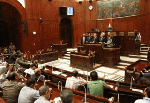Published on Tue, 2016-06-07 11:01
In describing the Paris Agreement (PA) as being "historic" and an important "milestone", key developing countries stressed that the Agreement is to enhance the implementation of the UN Framework Convention on Climate Change (UNFCCC) and not to replace it. At a side-event jointly organized by the South Centre and Third World Network on the first day of the Bonn climate talks (16-26 May), delegates from India, China and Egypt presented their views on the PA. They also stressed the need for a balanced approach in the implementation of the PA, emphasizing the importance of all elements including mitigation, adaptation and the means of implementation. |
Published on Sun, 2016-06-05 21:14
The defining feature of the framework for Egypt's national sustainable developmental strategy is the lack of a detailed roadmap to achieve several key goals, especially reducing poverty and unemployment and tackling the informal sector, for which it also lacks indicators. This is in addition to the lack of clarity in implementation mechanisms and the lack of consistency among the goals, despite the overarching strategy. The indicators used to measure the goals reflect the Government's continuation of the neoliberal approach, which is contingent on the development of the private sector and dependent on it to finance the development goals. Thus, for example, to reduce the deficit, the strategy does not include raising taxes on companies, instead opting to tax consumers, such as with the 10 percent value added tax (VAT). In addition, the strategy differs in important ways from previous development strategies, none of which were discussed in Parliament or through any sort of social dialogue. |
Published on Sun, 2016-06-05 21:09
The successful implementation of the 2030 Agenda requires bold and transformative steps that are urgently needed to shift the world on to a sustainable and resilient path. In order for it to be a collective journey, on which no one should be left behind, the scale and ambition of the 17 Sustainable Development Goals and 169 targets require a broad and integrated approach not only to balancing and realigning the normative architecture of the global economy but also to restructuring regional and national political-economic practices. Politics as usual and economics as the determined by the rich and powerful will have no place on this new path. Merely tinkering with uncomfortable edges of the micro-economic status quo will not do. The historical direction and social-structural content of such a shift will involve the modification of the deep structures of poverty in the periphery economies up to and including addressing the different aspects of state autonomy and the underlying democratic deficits that stand on the way of building sustainable national economies. |
Published on Thu, 2016-06-02 21:22
The connection between civil and political rights and tax policy is so strong, that in a 2014 report on tax policy and human rights (“the report”), the UN Special Rapporteur on Extreme Poverty and Human Rights in 2014 said that the link runs both ways. That is, civil and political rights bear consequences for tax policy. But the formation of accountable states is closely tied to the emergence of taxation. And where tax abuse and unfair tax practices erode confidence in government the environment will be less prone to foster the right to take part in the conduct of public affairs. |
Published on Thu, 2016-05-26 17:20
Every country and every region has something to do in the new global Agenda 2030, said Social Watch coordinator Roberto Bissio in Berlin, interviewed by Internationale Politik und Gesellschaft (IPG). Bissio said that ithe new agenda is more comprehensive. The rich countries are not only required to provide aid but also to introduce changes at home and to look at the footprints they leave, the impact of what they do internally in the global atmosphere, the oceans and the economy. "It is also an Agenda that provides major opportunities for us as citizen groups to interpelate our governments and ask policy makers what are you doing about this agenda that is relevant for all of us." |
SUSCRIBE TO OUR NEWSLETTER







